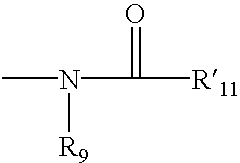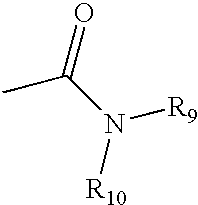2-substituted piperidines that are ligands for monoamine receptors and transporters
a monoamine receptor and transporter technology, applied in the field of 2substituted piperidines, can solve the problems of limited number of compounds that can be synthesized, desensitizing the receptor or ion channel, and limit the choice of reagents and conditions that can be employed for the synthesis of non-oligomeric libraries
- Summary
- Abstract
- Description
- Claims
- Application Information
AI Technical Summary
Problems solved by technology
Method used
Image
Examples
example 2
2-(2-Methanesulfonyloxy-ethyl)-piperidine-1-carboxylic Acid Benzyl Ester
[0330] 16
[0331] A solution of 2 (19 mmol, 5.0 g), MsCl (1.5 equiv, 28 mmol, 2.2 mL) and iPr.sub.2NEt (1.5 equiv, 28 mmol, 5 mL) in CH.sub.2Cl.sub.2 (63 mL) at 0.degree. C. was allowed to warm to 25.degree. C. and stirred for 12 h. The reaction mixture was quenched with 10% HCl (50 mL) and then extracted with EtOAc (2.times.100 mL). The combined organics were then washed with NaHCO.sub.3(sat) and dried with NaCl.sub.(sat) and Na.sub.2SO.sub.4(s). The solvents were removed in vacuo and chromatography (Isco Combi-Flash, 120 g cartridge, 1:1 Hexane-EtOAc) provided 3 as a colorless oil: LRMS m / z 341 (M.sup.++1, C.sub.16H.sub.23NO.sub.5S, requires 341).
example 3
2-[2-(4-Trifluoromethyl-phenoxy)-ethyl]-piperidine-1-carboxylic acid benzyl ester
[0332] 17
[0333] A solution of 3 (11 mmol, 3.8 g), .alpha.,.alpha.,.alpha.-trifluoro--p-cresol (1.5 equiv, 17 mmol, 2.7 g) and Cs.sub.2CO.sub.3 (2.0 equiv, 22 mmol, 7.0 g) in CH.sub.3CN (37 mL) was heated to 90.degree. C. and stirred for 12 h. Ethyl Acetate (100 mL) and H.sub.2O (100 mL) were added and the layers were separated. The organic layer was dried with NaCl.sub.(sat) and Na.sub.2SO.sub.4(s). The solvents were removed in vacuo and chromatography (Isco Combi-Flash, 120 g cartridge, 9:1 Hexane-EtOAc) provided 4 (3.2 g, 4.5 g theoretical, 71%) as a colorless oil: LRMS m / z 408 (M.sup.++1, C.sub.22H.sub.24F.sub.3NO.sub.3, requires 407).
example 4
2-[2-(4-Trifluoromethyl-phenoxy)-ethyl]-piperidine
[0334] 18
[0335] A solution of 4 (2.5 mmol, 1.0 g) in CH.sub.3OH (25 mL) was treated 30% Pd--C (100 mg) and H.sub.2 (Hydrogen balloon). The reaction was stirred for 5 h. The reaction mixture was filtered through Celite, and the solvents were removed in vacuo to provide 5 (683 mg, 683 mg theoretical, quantitative) as a colorless oil: LRMS m / z 274 (M.sup.++1, C.sub.14H.sub.18F.sub.3NO, requires 273).
PUM
| Property | Measurement | Unit |
|---|---|---|
| pH | aaaaa | aaaaa |
| covalent bond | aaaaa | aaaaa |
| covalent | aaaaa | aaaaa |
Abstract
Description
Claims
Application Information
 Login to View More
Login to View More - R&D
- Intellectual Property
- Life Sciences
- Materials
- Tech Scout
- Unparalleled Data Quality
- Higher Quality Content
- 60% Fewer Hallucinations
Browse by: Latest US Patents, China's latest patents, Technical Efficacy Thesaurus, Application Domain, Technology Topic, Popular Technical Reports.
© 2025 PatSnap. All rights reserved.Legal|Privacy policy|Modern Slavery Act Transparency Statement|Sitemap|About US| Contact US: help@patsnap.com



